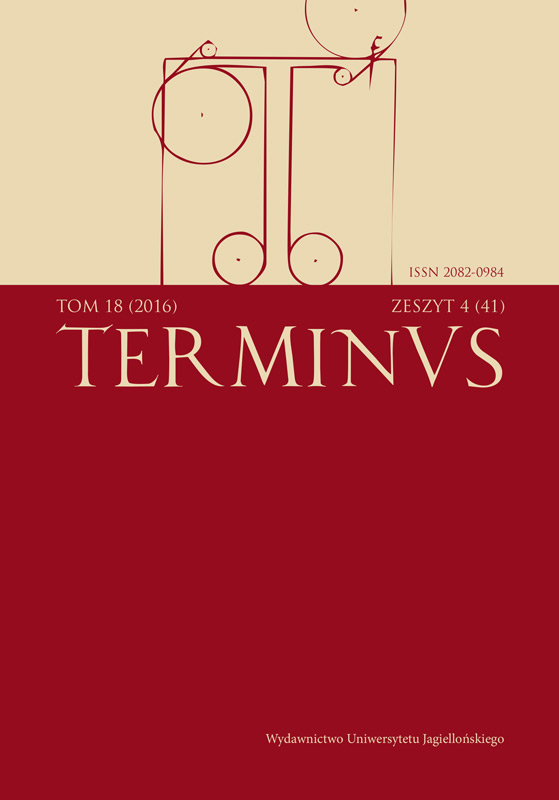Nieznane wiersze pochwalne na cześć Elżbiety z Branickich Sapieżyny i jej najbliższych krewnych
Unknown panegyric verses in honour of Elżbieta z Branickich Spieżyna and her closest relatives
Author(s): Szymon DąbrowskiSubject(s): Polish Literature
Published by: Wydawnictwo Uniwersytetu Jagiellońskiego
Keywords: occasional political poetry; panegyric poems from the second half of the 18th century; panegyric; Elżbieta z Branickich Sapieżyna; Kazimierz Nestor Sapieha; Franciszek Ksawery Branicki
Summary/Abstract: The aim of this paper is to present a critical edition of two, to-date unknown eulogies written to honour Elżbieta z Branickich Sapieżyna and members of her closest family: her son Kazimierz Nestor Sapieha, a general in the Lithuanian army, and her brother Franciszek Ksawery Branicki, the Great Crown Hetman. The two texts were edited according to rules based on solutions applied in the anthology: Wiersze imieninowe poetów z drugiej połowy XVIII wieku (introduction, selection of texts and ed. by B. Wolska, B. Mazurkowa, T. Chachulski, Warsaw 2011). The poems published here are prefaced with an introduction briefly sketching the subject scope of literary research on Elżbieta’s portraits (both pamphlet and laudatory ones). The circumstances in which they were written, chief eulogic motives included, and the genre shape of the presented eulogies are discussed. They are also provided with a commentary that explains the meaning of selected words and phrases, and provides information on the key contexts: political, biographical, mythological and biblical. The first text is an anonymous gift verse entitled: Do Jaśnie Oświeconej księżnej Jejmości Elżbiety z Branickich Sapieżyny, wojewodzicowej mścisławskiej, w dzień imienin 19 Novembris 1784 w Prenach (To her brightly enlightened grace, Elżbieta z Branickich Sapieżyna, wife of the Mścisław Voivode, on her namesday (November 19th 1784) in Preny). The only known copy of the print is kept in the collection of the National Library in Poland under the reference number XVIII 2.7409. The eulogy was written for Elżbieta’s first stay in that Lithuanian town in mid-November 1784. This laudatory composition presents her as a remarkable personage delighting the inhabitants of Preny as well as a model patriot who excellently prepared her son for the service for the country. It contains frequent references to the custom of dedicating poetic gifts called bouquets (Pl. bukiet), a popular act in the occasional poetry of the second half of the 18th century. The text also bears signs of high occasional ode poetics. The other work is a collection of four poems authored by Wojciech Zacharkiewicz, a little known publicist and poet, active between 1788 and 1793. The only known copy of the print is kept in the collection of the University of Warsaw Library under reference number 4.20.1.557. The elaborate title indicates that the cycle is a Gift from the citizens’ hearts... dedicated to the Sapieha family on the occasion of Franciszek Ksawery Branicki’s arrival at a Sejm meeting in Warsaw (December 17th 1788) and the election of Kazimierz Nestor Sapieha to the post of Marshal of the Sejm Confederation (October 7th 1788). Each of the poems in the collection is directed at a different person and presents their profile. In the first piece, the poet addressed the hetman and presented a portrait of an excellent commander; in the second, he emphasized the patriotic and citizenly comportment of the voivode’s wife; and in the third, he introduced the newly elected marshal as an unparalleled orator. The fourth poem supplements the whole with assertions of everlasting fame of the enlisted virtues and achievements of the notables. The air of general reverence created here; the instrumental reference to civic and patriotic issues; and the praise of harmful political actions of magnates, bestow a distinct imprint of panegyrism on both texts discussed.
Journal: TERMINUS
- Issue Year: 18/2016
- Issue No: 2 (39)
- Page Range: 159-188
- Page Count: 30
- Language: Polish

